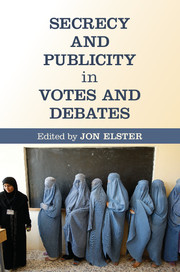Book contents
- Secrecy and Publicity in Votes and Debates
- Secrecy and Publicity in Votes and Debates
- Copyright page
- Contents
- List of Contributors
- Introduction
- 1 Public Voting and Political Modernization
- 2 Semi-public Voting in theConstituante
- 3 The Introduction of the Vote by Ballot in the Elections of Magistrates by the General Council of the Republic of Geneva (1707)
- 4 Suffrage and Voting Secrecy in General Elections
- 5 Secret Voting in the Italian Parliament
- 6 Open Decision-Making Procedures and Public Legitimacy
- 7 How Publicity Creates Opacity
- 8 Secret-Public Voting in FDA Advisory Committees
- 9 E pluribus unum
- 10 Why Open Voting in General Elections Is Undesirable
- 11 Open-Secret Voting
- 12 Secret Votes and Secret Talk
- Index
- References
1 - Public Voting and Political Modernization
Different Views from the Nineteenth Century and New Ideas to Modernize Voting Procedures
Published online by Cambridge University Press: 05 August 2015
- Secrecy and Publicity in Votes and Debates
- Secrecy and Publicity in Votes and Debates
- Copyright page
- Contents
- List of Contributors
- Introduction
- 1 Public Voting and Political Modernization
- 2 Semi-public Voting in theConstituante
- 3 The Introduction of the Vote by Ballot in the Elections of Magistrates by the General Council of the Republic of Geneva (1707)
- 4 Suffrage and Voting Secrecy in General Elections
- 5 Secret Voting in the Italian Parliament
- 6 Open Decision-Making Procedures and Public Legitimacy
- 7 How Publicity Creates Opacity
- 8 Secret-Public Voting in FDA Advisory Committees
- 9 E pluribus unum
- 10 Why Open Voting in General Elections Is Undesirable
- 11 Open-Secret Voting
- 12 Secret Votes and Secret Talk
- Index
- References
- Type
- Chapter
- Information
- Secrecy and Publicity in Votes and Debates , pp. 15 - 51Publisher: Cambridge University PressPrint publication year: 2015
References
- 11
- Cited by

